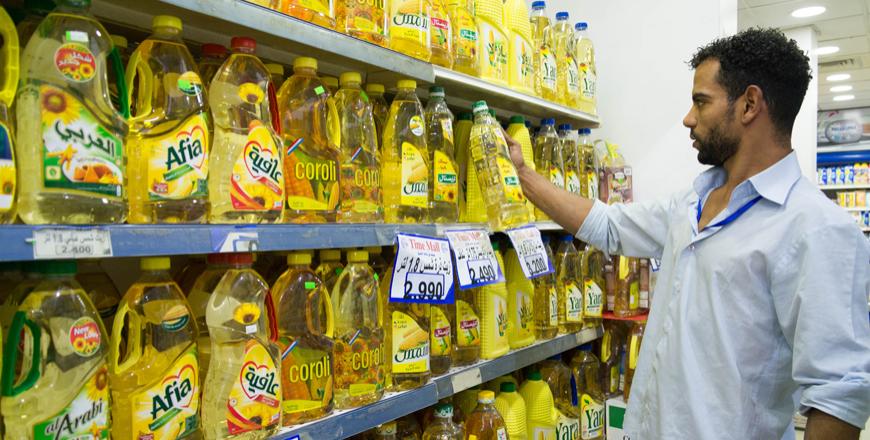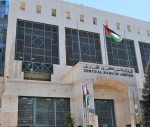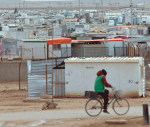You are here
Jordanian producer of vegetable oil faults gov't, banks for downturn
By Samir Ghawi - Jun 08,2015 - Last updated at Jun 09,2015

A worker arranges oil containers at a supermarket in Amman on Monday (Photo by Amjad Ghsoun)
AMMAN — Al-Qarya Food and Vegetable Oil Industries Co. last week faulted the government and banks for its misfortune.
In a letter to the Jordan Securities Commission (JSC), Chairman Tareq Khoury evoked the 2008, 2009 and 2010 events when the company was battered by the international financial crises which afflicted all industrial and commercial sectors.
"Al-Qarya heeded the government recommendations in 2008 to all industrial and commercial sectors to stockpile large quantities of food products as strategic reserve in order to circumvent the expected surge in their prices, " the chairman wrote.
"To ensure food security and preempt the expected price surge of foodstuffs as a result of crude oil price reaching $105 per barrel at that time, we responded immediately to the advice of the Prime Ministry," he said.
"But, regrettably, international vegetable oil prices dropped afterwards due to the quick fall in crude oil prices," Khoury added in his letter.
According to the chairman, who is also a member of the Lower House of Parliament, further trouble piled up when the government exempted imported vegetable oil from customs and sales tax bringing the firm to a standstill in that period.
Khoury also mentioned the extremely high interest rate on the loans extended by Jordanian banks to the company, in spite of the reduction initiated by the central bank, as another main reason for the losses incurred in 2009.
"The company requested banks several times to lower interest rates as directed by the central bank, but regrettably in vain," he said.
Noting that losses continued until 2011, the chairman added that the company was on top of things in the following year when strategic partners injected JD5 million bringing the capital up to JD9.5 million.
This deal enabled Al Qarya to achieve settlements with creditor banks, secure a JD0.8 million in savings and obtain a working capital for purchasing vegetable oil and packing material necessary for operations.
But the losses that returned in 2013 and 2014 were, according to Khoury, mostly due to the fluctuation in international prices of vegetable oils.
Yet again, he reiterated that bank interest rates were still another main cause for the losses which amounted to JD0.4 million last year compared to JD0.2 million in 2013.
"Interest on loans unpaid since 2008 and loans obtained to buy raw materials and other packing and packaging supplies needed for operations burdened the company," he wrote.
The annual report showed that the cost of production last year was slightly higher than the earnings from sales and that financial expenses amounted to JD0.2 million in 2014.
In his letter to the JSC, Khoury disclosed an action plan that focuses primarily on boosting sales to shore up Al Qarya, whose labour force comprises 21 employees.
The chairman said the management intends to raise sales to JD8.5 million in 2015, 20 per cent higher than the JD7.1 million registered in 2014. This increase will be accompanied by spending controls in order to achieve JD0.5 million net profit, or 6 per cent of net sales, and reduce the accumulated losses which stood at JD7.5 million at the end of March 2015.
Another 25 per cent boost in sales intended for 2016 will bring sales to JD10.6 million and generate about JD0.8 million net profit.
According to the plan, a further 30 per cent upsurge will expand sales to JD13.8 million in 2017 and profit to JD1.3 million.
Al-Qarya's 2014 annual report showed that sales grew from JD3.5 million in 2011 to JD8.1 million in 2012 before peaking at JD10.4 million in 2013 and dropping back to JD7.1 million in 2014.
Besides the determination to augment sales, the management will endeavour to defer the payment of raw material imports by 90 days at low interest to be added to the cost of oil. This adjustment will enable the company to lower the interest that it pays to banks.
The auditor, Ghosheh & Co., told the shareholders during a recent general assembly meeting that the company will resort to restructuring the capital if it fails to lower the accumulated losses to less than 75 per cent of the capital.
Financially, the balance sheet as of March 31, 2015 showed current liabilities at JD2.6 million, of which JD1.1 million was debt to banks. Another JD0.5 million was a long-term debt.
Total assets at the end of this year's first quarter amounted to JD3.9 million, of which JD2 million were property and equipment, JD0.7 million stocks, and JD0.7 million receivables.
Although capitalised at JD9.5 million, shareholders equity was JD0.8 million due to accumulated losses and negative issuance premium.
The bleak financial position was portrayed positively as the letter to the JSC estimated the market value of the land and the equipment and machinery of the plants and other facilities at JD5 million, describing the 40,702 square metres of land in Al Jiza as a strategic location and the production lines as highly technical.
The letter also estimated the value of Al-Qarya trademark at JD2.5 million noting that Al-Qarya's sunflower oil possesses a 46 per cent share of the local market.
"The consumption of vegetable oils in Jordan, except olive oil, is around 120,000 tonnes annually," the letter indicated. "10 per cent of the quantity is for sunflower oil, 20 per cent for corn oil, 30 per cent for soy oil and 40 per cent for palm oil."
Al Qarya major shareholders as of December 31, 2014, were Tareq Mohammed Ibrahim Al Hasan (47.4 per cent); Tareq Sami Hanna Khoury (24.6 per cent); and Injaz for Supply and Distribution (5.3 per cent).
Related Articles
AMMAN — Three shareholders, out of 357 investors, decided this month to overhaul First National Vegetable Oil Industries Company (FNVO).&nbs
AMMAN — Interests and commissions on bank loans caused much of Optimiza's accumulated losses, the company told the Jordan Securities Commiss
AMMAN — Selectivity rewarded Philadelphia Insurance with a JD0.9 million technical profit last year as the company also steered clear of pri















